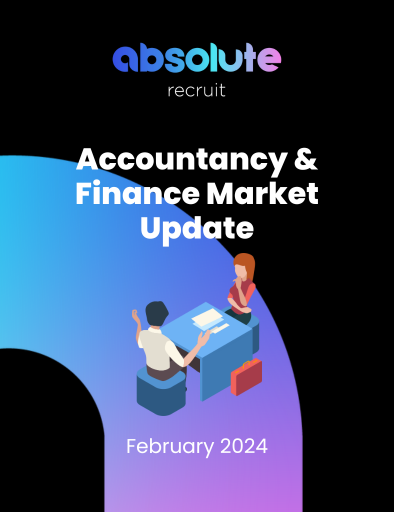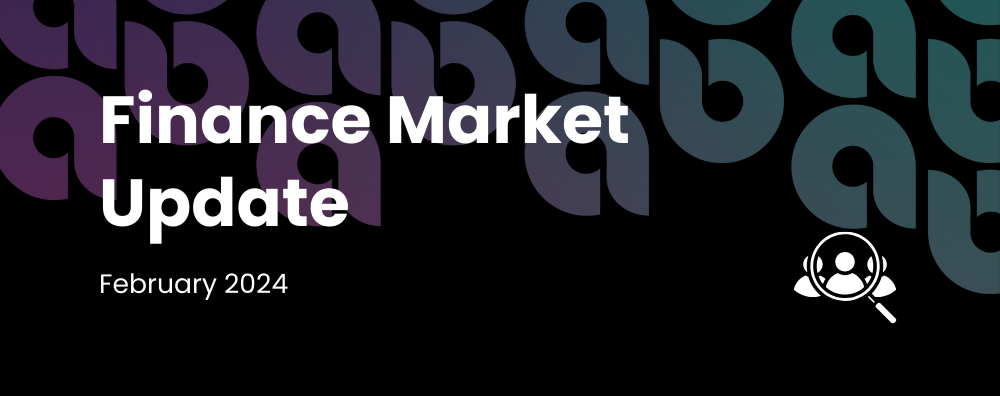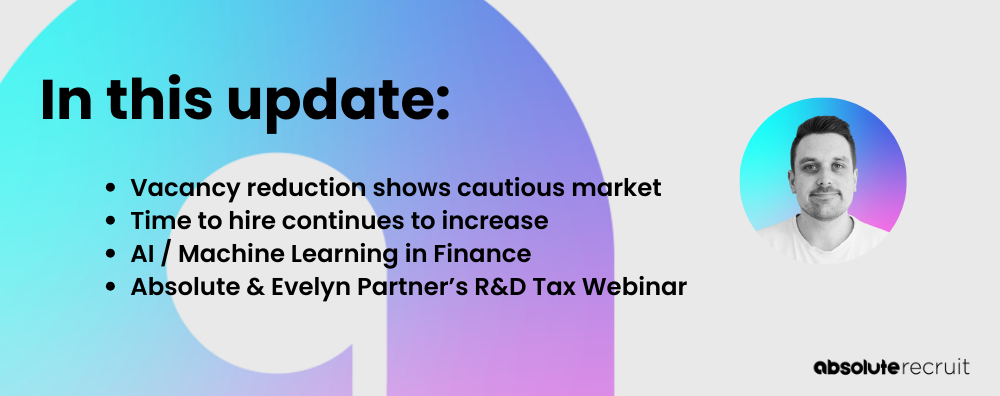




Hello, and welcome to February’s Finance Market Update. I’ll start by thanking everyone who attended our R&D Tax Webinar, and Evelyn Partners for presenting – the feedback has been excellent. You can find a link at the bottom of this article to a recording if you missed it! We are always interested to hear about topics that our community finds interesting or useful – so feel free to drop me a note with any suggestions for future webinars!
There’s a theme developing from our reports below as economic uncertainty continues to loom. From a recruitment perspective, increased uncertainty increases time-to-hire. It causes candidates to approach their search more cautiously, which means it’s a challenging time for employers (and recruiters) right now. That said, in Q1 we are seeing some investment firms loosen their purse strings, particularly in the health-tech sector. We’re still seeing a lot of movement in the £30,000 – £75,000 range of the market and as always, newly quals, remain the most sought-after commodity. To ensure that you don’t miss out on the dream candidate, we suggest companies review and streamline their hiring processes regularly, in this article we have included some quick wins to help your internal talent teams.
Finally, with AI on everyone’s agenda, we will discuss how Artificial Intelligence and Machine Learning are fitting into the finance landscape.

Caution in the market
According to the Office for National Statistics, the estimated number of vacancies in the UK from November 2023 to January 2024 was down by roughly 16% compared to the same period last year.
Comparing figures for the last year in finance specifically, the number of job postings decreased by 38% in 2023. With a 42% decrease in the last quarter alone.
It looks as though 2024 will continue to prove challenging for many businesses. With cash flow still a concern for a lot of finance teams, companies are continuing to look for ways to reduce spending, including layoffs and restructuring.
Working across the London Finance market, here’s what we’re seeing at present.

Time to hire
As we’ve discussed in previous updates, the average time to hire has continued to waver, as we saw an increase from 5.8 weeks to 6.1 weeks between the last two quarters of last year.
The issue here seems two-fold: with cuts being made, employers are demanding more from employees, making vacancies difficult to fill, add to that companies are more cautious in who they take on and it’s easy to see where the hold-ups are.
For some companies, using a third party isn’t an option right now, however, there are several things an internal recruitment team can put in place to create a smoother hiring process and reduce frustration between all parties.
Build an efficient, structured interview and feedback process before beginning your search.
Make sure you know what questions need answering by the recruitment team before an individual gets to the hiring manager for review. A script of qualifying questions will do the trick! This can save time in sending through poor-quality candidates, especially if your internal recruiter isn’t a specialist in the area.
Earmark interview slots across several days that you are asking the hiring manager (and anyone else involved) to commit to that you can fill with the relevant candidates. These should be planned in advance and cover all stages of interviews.
Have the second interviewer on standby – if the first interview is going well, you can then invite the second interviewer in and save organising another interview.
Provide a slick process for getting real feedback from the hiring manager – whether it’s a written scorecard throughout the interview, or a de-brief directly after the interview, make sure you get the feedback from the hiring manager while it’s fresh in their mind and record it to relay to the candidate.
Book in slots to feedback to each candidate ahead of time and stick to it.

AI / Machine Learning and Finance
A hot topic with candidates and clients remains how organisations are harnessing the power of AI within finance, and we’ve seen this topic skyrocket in the last year, but what are the wider implications for the finance industry as whole?
Finance technology has already improved efficiency immensely over the last 5-10 years; basic automation is already in place with most ERP systems. However, there are still a plethora of financial processes that are ideal targets for AI and Machine Learning.
AI algorithms unlock unprecedented levels of efficiency, accuracy, personalisation and risk management for finance professionals. Unlike rule-based automation that most finance teams operate, AI can handle much more complex scenarios and should be able to fully automate a lot of the repetitive, manual processes. Robotic Process Automation (RPA) systems will soon do a vast amount of basic functions such as accounts payable processes, account reconciliation and even fraud detection.
A great example of the next stage of RPA is detailed in a recent feature from Datarails, revolutionising FP&A using AI. Datarails have developed an AI chatbot where you can ask it questions like “which customers drove our revenue variance to budget last month” or give it instructions such as “Visualize our sales trend for the last 12 months”. Could this benefit SME companies that don’t currently have FP&A functions, and will it empower established teams to have better data and make decisions quicker?
The ICAEW wrote a report that said, “Artificial intelligence systems can be very powerful and are improving quickly. They provide outputs that can be extremely accurate, replacing and, in some cases, far superseding human efforts. However, they do not replicate human intelligence. We need to recognise the strengths and limits of this different form of intelligence, and build understanding of the best ways for humans and computers to work together”.
The implications for AI in finance is huge, but it is still very much in its infancy. If utilised in the correct way, it will be a very powerful tool for accountants and finance teams.
R&D Tax Webinar
Last week, we were joined by Evelyn Partners to discuss the intricacies of R&D Tax and understand how the latest updates from HMRC would affect future claims.
There was a lot packed into the 40minute session, including an overview of the current landscape for R&D claims, the recent changes and what that means for businesses (both SMEs and larger organisations), future changes, including the merging of R&D regimes, the increased scrutiny from HMRC on claims and the impact of that on companies.
It was an incredibly insightful session, if you weren’t able to attend, you can download the webinar recording and presentation slides here.

Thank you for taking the time to read our senior finance market update. As always, if you would like any advice on hiring, candidates, salary benchmarking, or a general chat about the market or to discuss your next role, you can now book a 30-minute call with me using this link – https://calendly.com/ashley-absolute-recruit/30min
N.B For those of you who are not aware, we also run a Senior Finance Community where members share ideas, experiences and solutions to finance-related issues, primarily through our WhatsApp group and quarterly meetups. If you would like more information or wish to join, drop me an email on ashley@absolute-recruit.com